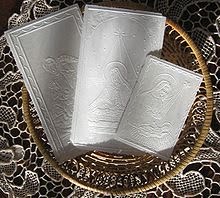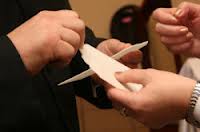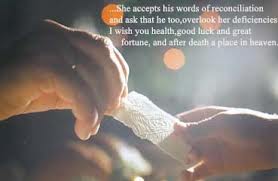
In our church, you will find the opłatki on a table to the left of the sanctuary (the sacristy side). You’ll also find a basket for donations. Opłatki are usually produced by religious communities, who support themselves through this work. Your donation reimburses the parish for its purchase of the opłatki, and by extension helps to support religious communities. As always, when we make a donation in charity, our sacrifice of something of our own is a way of united ourselves with the sacrifice of Christ on the Cross. In Polish, this spirit of sacrificial giving is expressed in a rhyming sentence: “Great faith; great offering.” Our offering when we obtain our Christmas opłatki is a small part of the spirit of penance and self-sacrifice by which we purify our hearts for the coming of Christ on Christmas. In a season that is often given over to materialistic excess, it is good to keep this thought in our minds and this spirit in our hearts.
Now, what do you do with opłatki once you have them? One of the reasons they are offered so early in the season – well before the opłatki ceremony of Christmas Eve – is that Polish people send these wafers to distant friends and relatives inside their Christmas cards. (If a large wafer is too big to fit into your card, it is easy to cut cleanly with a pair of scissors.) If you have Polish friends living far away, and they send you a Christmas card, you can expect a piece of opłatek inside the card. If you are sending cards to Polish friends, you can reciprocate by observing the same custom. This exchange of opłatki in cards takes the place of being physically present to one another at Christmas and able to share opłatki together in person.
If you are far from your family, you can introduce them to the custom of sharing opłatki by mailing them a sufficient quantity of the wafers (they travel remarkably well by mail slipped into a card inside and envelope, but to be safe, you can send a packet or two in a padded envelope). Print out the opłatki information from this page and include it in your packet (or translate it into your own language). Many non-Polish families who have been introduced to this tradition have found it a deeply touching and memorable custom to add to their Christmas Eve celebrations, as well as a way to feel linked with family members who are far away in Poland at Christmas. Just be warned that if opłatki are not available in your home country, you may find that family request you send them a supply every Christmas while you are in Poland.

A final, quite practical reason for people getting opłatki early is that churches run out of them and a family might find itself on Christmas Eve with no opłatki. As you will gather from the beauty and warmth of the opłatek tradition, this would be a Christmas Eve disaster that would not soon be forgotten!
Wigilia
The Polish name for Christmas Eve is Wigilia, from the Latin vigilare, meaning “to await.” The word has a sense of alert watchfulness, as in our English word “vigilant” or the expression, “to keep vigil.” For those who observe Advent mindfully and prayerfully, the four weeks are a time of constant preparation: there is the spiritual preparation of prayer, abstinence on Fridays, careful attention to the readings at Mass, singing hymns that echo the longing of mankind for the appearance of the Saviour, making a good confession – in short, a kind of spiritual “housecleaning” to make our hearts and souls a welcome and suitable dwelling for the awaited Messiah. There is also a great deal of practical preparation, perhaps especially in a traditional Polish household: the house must be thoroughly cleaned, windows washed, the table carefully set, and many traditional dishes prepared. The more deeply individuals and families enter into a spirit of preparation for the coming of Christ at Christmas, the more profound will be the celebration of Wigilia, that moment of great joy when it is announced that the Child has been born and dwells among us!
Many of us come from cultures where carols are played and Christmas decorations go up in late November, and we are constantly bombarded with advertisements and inducements to spend money. Long before Christmas Eve we’ve had our fill of Christmas food, decorations, music, shopping and “celebration.” Some of us, to be honest, may have found ourselves thoroughly sick of Christmas long before December 25th. As foreigners in Poland, it may be a bit easier to tune out the commercialism of Christmas and enter more deeply into the spirit of Advent and the spirit of Wigilia, and perhaps restore our sense of wonder and joy in Christmas.
Sharing Opłatki on Christmas Eve
When the sun has set on Christmas Eve, and the sky begins to darken, the youngest child is sent outside to watch for the first star, just as the three Wise Men watched for the star that led them to the place of Jesus’s birth. When the first star is spotted in the evening sky, the child comes in and announces that the star has appeared. Then, inside the house, like a signal that the Light of the World is about to appear, candles are lit. The host or head of the household (the father of the family or the oldest person, usually) begins the Opłatki ceremony:
HOST: May the name of God be praised!
ALL: For ever and ever Amen.
HOST: In the name of the Father and of the Son and of the Holy Spirit. On this year’s shortest of days and longest of nights, a star appears shining in the darkness. For on this night, “the Word was made flesh…”
ALL: “And dwelt among us!”
HOST: “God is born,” proclaims the majestic Christmas carol. Jesus, Son of God, is born of Mary. For on this night, “the Word was made flesh…”
ALL: “And dwelt among us!”
HOST: The star has appeared announcing His birth. The star of Bethlehem guides the Three Wise Men in their search for the new-born King. For this night, “the Word was made flesh…”
ALL: “And dwelt among us!”
HOST: This night a Child is born to us; a Son is given to us. His name is wonderful Counselor, eternal Father, Prince of peace. “The Word was made flesh…”
ALL: “And dwelt among us!”
HOST: Throughout the ages on this eve, as the first star appeared, our ancestors throughout the world celebrated with joy this Christmas Vigil as we do today. For “the Word was made flesh…”
ALL: “And dwelt among us!”
HOST: Our forefathers celebrated this evening with the breaking of the bread, the Christmas Opłatek. Following their example we share in this sacred heritage. In the breaking of this bread and sharing of this meal, Jesus is born for us this evening, around this table, under our roof, in our hearts. Let us now listen to the story of his birth as recounted by St. Luke:
A READER presents the Gospel of Midnight Mass: Luke 2:1-14
READER: In those days a decree went out from Caesar Augustus that the whole world should be enrolled. This was the first enrollment, when Quirinius was governor of Syria. So all went to be enrolled, each to his own town. And Joseph too went up from Galilee from the town of Nazareth to Judea, to the city of David that is called Bethlehem, because he was of the house and family of David, to be enrolled with Mary, his betrothed, who was with child. While they were there, the time came for her to have her child, and she gave birth to her firstborn son. She wrapped him in swaddling clothes and laid him in a manger, because there was no room for them in the inn. Now there were shepherds in that region living in the fields and keeping the night watch over their flock. The angel of the Lord appeared to them and the glory of the Lord shone around them, and they were struck with great fear. The angel said to them, “Do not be afraid; for behold, I proclaim to you good news of great joy that will be for all the people. For today in the city of David a savior has been born for you, who is Messiah and Lord. And this will be a sign for you: you will find an infant wrapped in swaddling clothes and lying in a manger.” And suddenly there was a multitude of the heavenly host with the angel, praising God and saying: “Glory to God in the highest and on earth peace to those on whom his favor rests.”
HOST: At this feast, we share the joy of heaven. We rejoice with the Holy Family of Bethlehem. Having sighted the first star, we gather at this table to hear glad tidings of comfort and joy. Summoned to the festival, we break bread and share the holy wafer. The breaking of this bread brings with it a promise of reconciliation and peace. As we share it with each other, we are bound to forgive each other all the wrongs we have done in the past, and never return to them. Through forgiveness the Lord is born in our family, as Bethlehem, “the house of bread,” happens once again among us. For this reason the holy wafer is called the “bread of love.” Glory to God in Highest Heaven! And Peace…
ALL: Peace to His people on earth!
Traditionally, before the Opłatek is shared, the head of the household (usually the father of the family or the oldest member) extends Christmas wishes to all and remembers those who are not able to be present. Family members who have died in the past year may be remembered. Calling to mind those with whom Christmas Eve was celebrated in the past reminds everyone that our families extend not only around the Christmas table and to relatives far away, but back in time through the generations, and that our family members who are in the hands of God are still part of our lives.

For those of us not used to this custom, coming up with appropriate wishes on the spot may be stressful (especially if you’re trying to offer wishes in Polish). Here are a few traditional wishes you can offer and be sure that you are “doing it right”:
Health and good fortune this Wigilia! (Na szczęście, na zdrowie, ze świętą Wiliją!)
May we meet next year at this time to celebrate Wigilia! (Abyśmy się doczekali następnej Wigilii!)
May you be blessed with health, happiness and good fortune, and after your death a crown in heaven! (Życzę zdrowia, szczęścia i fortuny, a po śmierci niebieskiej korony!)
May a golden star always shine over our home! (Niech zawsze nad naszym domem świeci złota gwiazda!)
May all your dreams come true! (Niech się spełnią wszystkie marzenia!)

